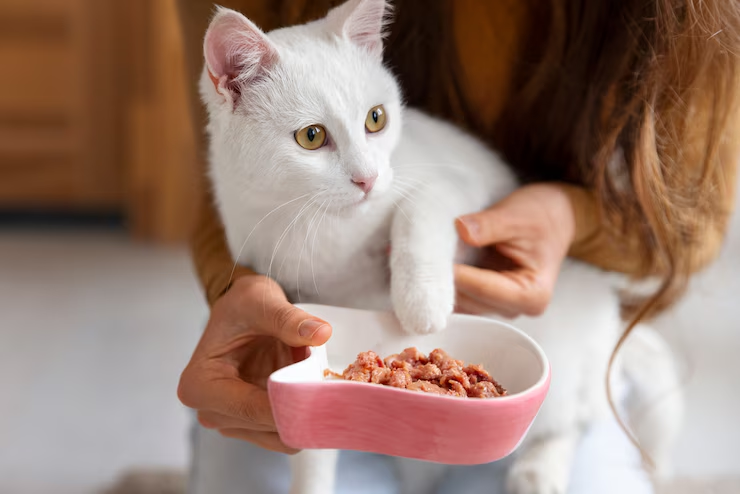The Complete Handbook of Homemade Cat Food: Nutrition, Recipes, & Tips For Your Feline’s Diet

Purpose: The Advantages of Feeding Cats Homemade Cat Food and Why You Should Consider It
Like any other pet owner, you want your cat to be as healthy as possible. Hence, you have probably wondered how to make cat food that is nutritious and yet goes down easily. Even though buying cat food from a store is easier, many cat owners choose to make homemade cat food so that they can control everything that goes into their pet’s food. Is cat food as easy to make as people think? Is it really good for your cat? Sit tight, and I will show you how to do it safely and efficiently.
This guide is intended to cover everything from the health benefits and ingredients to the risks and approved recipes for each part of your cat’s life. That way, you will know everything you need in order to make the right choices for your cat.
Does Homemade Cat Food Have Any Benefits? The Benefits of a Cat’s Diet Plan
Preparing cat food from scratch offers a few advantages, primarily for the owners who have the time to research. Compared to other options available in the market, cat food prepared at home does not have preservatives, additives, or low-quality components. Here are some of the reasons why some pet owners are shifting to home-cooked cat food from Kiko.
Tailor-Made Meals
With homemade cat food recipes, you can be sure that the recipes meet the required nutritional targets for each pet type. Your cat’s various life stages, including kittens, adults, and seniors, require differing amounts of protein, fats, vitamins, and minerals. However, the blended diets catered would ensure that their overall health is never compromised.
Ingredient Further Chosen
When you cook at home, you select the ingredients. As such, it is easy to avoid any artificial fillers that are often aggravating in some commercial preparations. Fresh meats, vegetables, and other nutritional supplements can be picked up to ensure that your cat is sufficiently nourished.
Can Target Specific Concerns
The ability to cook provides an option to tailor-make recipes concerned with food allergies, obesity, or digestive issues in cats. For example, you can include specific ingredients to better manage the cat’s weight, like fiber or granules probiotics for improved digestion.
What You Should Be Careful With While Preparing Homemade Cat Food
Cats tend to enjoy the taste of homemade cat food, but you have to be careful about the precautions. Some commonly used food items can be dangerous to cats. Make sure to consider the following when cooking food for your cats.
Toxic Foods
While many people’s foods are safe for cats, you should avoid giving them onions, wine, garlic, raisins, and chocolate. These foods are harmful and should not be given to cats under any circumstances.
Not Providing All Necessary Nutrients
Cats, by nature, require meat for survival, which makes them obligate carnivores. Cats need a good protein source that contains vital components, including taurine, Arachadonic acid, and Vitamin A. Any deficiency can cause severe health problems. Make sure to do your research and follow vet-approved recipes.
Not Serving The Right Portions
Feeding too much or too little food to your cat can have adverse effects on their health. Obesity and Stunted growth are some of them. Always keep in mind your cat’s age, activity level, and weight before adjusting the serving sizes.
Nutritious For Homemade Cat Food
Here are a few nutritious homemade cat food recipes that are easy and fun to make. Try these recipes, and your cats will fall in love with the food.
Chicken And Pumpkin Stew For Cats
Ingredients:
- 2 chicken breasts (boneless and skinless)
- 1 cup of pureed pumpkin
- 1/2 cup of carrots (steamed and mashed)
- 1/4 cup of bone broth (optional)
Preparation:
- Boil chicken breasts and shred them apart.
- Mix the pumpkin puree and carrots.
- For more moisture and flavor, add the bone broth.
- Serve at suitable sizes for your cat.
Salmon And Spinach Delight
Ingredients:
- 1 can of wild salmon (drained)
- 1/2 cup of steamed spinach
- 1 tablespoon fish oil
Preparation:
- Shred the salmon into little chunks.
- Add the oil and spinach to the rest of the food.
- Either serve it cold or put it in the fridge for later.
Raw Homemade Cat Food vs Cooked Recipe: Which Is Better?
Among pet owners, one of the most asked choices to consider is if raw homemade cat food is better than cooked meals. Both have their pros, but each one hinges on the particular needs of the cat and what the owner is willing to provide.
Cat Food: Raw
Diets that consist of only raw food always claim to be the best because they keep all the enzymes and nutrients that one would find in raw meat. But unfortunately, there are some dangers associated with it, especially with food and germs. Sticking to a strict rule of hygiene will help, while also using high-quality meat certainly helps.
Cat Food: Cooked
Making cooked food for cats is arguably one of the best ways to prepare it. Shadows of harmful bacteria get eliminated, which makes it safer for cats to eat. Vitamins and nutrients are still available in balance in cooked meals, but don’t get too carried away by cooking. Overcooking means shading the food’s nutritional essence.
Tips on How to Shift Your Cat to Homemade Diets in a Step-by-Step Way
The main tip is to possess some level of patience as you try to alter your cat’s dietary patterns. Shifting from commercial food to self-prepared recipes is no easy task, so here’s a dose of clarity.
- Add Gradually: Slowly add and mix in self-prepared food with the current one. This ensures that there is no problem with regard to digestion.
- Track Your Cat: Watch your cat’s health or any signs that show how your cat is adapting to the new diet. If there is any trouble, change the recipe. It can also be fixed by new ingredients being introduced slowly.
- Remain Firm: A few days or a week after shifting, stick to a feasible schedule regarding the portions or meals.
What Ingredients Should Be in Homemade Cat Food?
A nutritious homemade cat food recipe takes into account various components to ensure your cat’s well-being. Here are the most essential components:
Animal Protein
Cats require high-quality animal protein such as chicken, beef, turkey, or fish. Protein facilitates muscle growth and boosts immune function and energy.
Fats
Fats are essential for energy and the maintenance of healthy skin and coat. Fish oil, chicken fat, and duck fat are good sources of healthy fats.
Water
Essential vitamins and minerals such as Vitamin A and B vitamins, calcium, phosphorus, and water are vital for the proper utility of protein. Never forget to always provide a multivitamin supplement specially formulated for feline’s needs.
Cats frequently do not drink sufficient amounts of water. Hydro broth and steamed vegetables are moisture-rich ingredients that can aid hydration.
Common Mistakes to Avoid When Preparing Homemade Cat Food
When preparing homemade cat food, one must be precise. Do not make these mistakes to make sure your cat’s diet is healthy and balanced at all times:
- Discussing with a Veterinarian: You should first speak to your vet before making homemade cat food so that you can be sure that your cat’s diet is balanced.
- Ignoring Supplements: Omitting certain supplements can be harmful when preparing meals from scratch since they do not provide crucial nutrients.
- Ignoring Portion Control: It is important to note that your cat’s diet should be proportioned according to its size, weight, and level of physical exercise.
Final Words: Manage Your Cat’s Meals to Improve His Quality of Life
You have more control over what goes into your cat’s food, and that means you can help meet any specific dietary needs. This, along with the use of more wholesome ingredients, can improve the overall quality of your cat’s food. However, step-by-step guidance from your vet and thorough research will help you ensure that your cat’s health will be maintained while utilizing suitable feeding techniques. Transitioning to home-cooked meals carefully can enhance your feline friend’s lifestyle and overall health so you can make educated choices.
Also Read Bucatini for Beginners
Common Questions Regarding Homemade Cat Food
Q: Is it safe to feed my cat solely homemade cat food?
A: Absolutely, as long as the meals are freshly prepared and nutritionally complete. Make sure to consult your vet for an approved dietary plan.
Q: Homemade Meals vs. Store-Bought Meals: Which one is cheaper?
A: Homemade meals require an initial investment for the ingredients, but buying in bulk makes it more cost-efficient over time. Pre-prepped meals can also be bought for available or emergency use.
Q: Can I make homemade food for a kitten?
A: Yes, but kittens have strict dietary requirements, and it is necessary to give them vet-approved food recipes to manage their nutrition properly.

One Comment